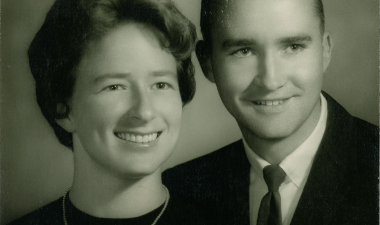Unbridled love of botany and teaching defined Stanislaus State Professor Emeritus Steve Grillos, who passed away Feb. 9. He was 93.
So much did he love his work that for more than 20 years after his retirement, Grillos voluntarily taught histological and cytological techniques, sharing with students how to properly prepare microscopic slides to view plant structures and other specimens. He also taught illustration and other botany classes during his nearly 50-year tenure with the Department of Biological Sciences.
“He was quite a talent,” said Stuart Wooley, who arrived at Stan State in 2007 and still possesses, as, as does the department, many slides Grillos made.
Beyond his technical skill, Grillos was an instructor who taught colleagues and students, alike.
“I wouldn’t say he took me under his wing when I got here, because he only taught one class and wasn’t here that often,” Wooley said. “He was a really good resource for a young guy starting out. He started there before I was born and worked into his 70s and 80s. He was so nice and easy going and interested in helping out. He wasn’t one to chit chat or talk about random things. He might spend a minute or two asking about your family, but then he wanted to talk shop.”
Wooley isn’t the only colleague to have experienced that support from the long-term professor.
“He was very welcoming when I first started teaching at Stan State and remained a friend and trusted colleague throughout my 31 years there,” said Tommi Lou Carosella. “Dr. Grillos was very generous in sharing his expertise and resources.”
During much of their time as colleagues, Grillos taught botany lecture classes, and she taught the labs.
“I was forewarned by other department members to make sure that if I used any materials from his lab, or if I taught in his lab space, to make sure everything was shipshape and back in place before leaving.,” Carosella she said. “He was meticulous and organized, with a preferred method and place for everything.”
That may have stemmed from the work he did, Wooley said.
“He did a lot of microscopy, and you have to be really particular,” Wooley said. “You’re looking at really teeny, tiny things and you have to be careful with the light on it, be careful how you stain it and not move it much or everything is messed up. That would fit that characteristic.
“His office was very organized and super clean. I always thought it was because he was here part time, but then I could totally see that was how he was.”
If Grillos wanted order in it, he also was generous with his office. Once he began teaching as a volunteer, he offered it to another part-time faculty member to use, a gesture of kindness that doesn’t surprise Carosella.
“Steve Grillos was a wonderful mentor and influence on a generation of scientists and teachers,” Carosella said. “He was much loved by his students, because it was obvious how much he cared about them and about teaching.”
One student wrote in an evaluation, "The greatest gift Dr. Grillos has given me is the example he set every day in class. His caring and respect for every student, without exception, was at the core of his teaching. If I can be a teacher who even has a small measure of his great gift, then I will be satisfied."
Grillos taught at Stan State from1965-1992 when he began teaching voluntarily. He was named Professor of Botany, Emeritus status, received the University’s Outstanding Professor of the Year Award for the 1992-1993 academic year and the University’s Presidential Medal of Distinction in 2008.
His voluntary teaching continued until around 2014, said Wooley, chairman of the Department of Biological Sciences at the time.
Grillos often shared stories of his teaching career with Wooley, including of trips he led during winter session to the CSU Desert Study Center in the Mojave Desert.
“He had story after story,” Wooley said. “Looking at his career, including more than 20 years as a volunteer teacher, you know he loved it, was passionate about it. But he balanced it out. He wasn’t volunteering because he didn’t have other options. It was just something that was a part of him, but he also spent time with his wife and family.”
Born to Greek immigrants on Jan. 15, 1928, Grillos grew up in Rock Springs, Wyoming, where his father worked as a coal miner. Grillos served two years in the U.S. Navy after graduating from high school. He went on to earn his bachelor’s degree in botany from the University of Denver, Colorado, his master’s in botany from the University of Wyoming and his Ph.D. from Oregon State University. He moved to California and taught at the University of the Pacific and Cal State Hayward before arriving at Stan State in 1965.
Grillos’s scholarly work included his book, “Fern and Fern Allies of California,” and in 2020 he began working on a paper about mistletoe in valley trees. One of his favorite stories to share with his grandchildren was his version of “Jack and the Bean Stock.”
The balance in his life of which Wooley spoke included spending time with his large family, working in the garden of his Turlock home, playing friendly games of poker with friends or family, watching John Wayne movies or reruns of “Sanford and Son” on television and volunteering at the Annunciation Greek Orthodox Church of Modesto, where he was a past president of the Parish Council.
Grillos was married to Georgia Pallios, of Ceres, from 1952 until her death in 1996. He married Bessie Pappas, of Modesto, in 1998.
He is survived by Bessie, daughters Holly (Nick), Billie (Manny) and Stephanie (Gregg), seven grandchildren and seven great-grandchildren.


